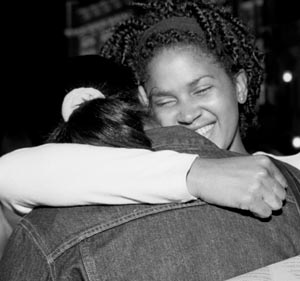Women will never be safe from rape until they are fully integrated into society, Susanne Dietzel, Director of the Loyola Women’s Resource Center, said at Wednesday’s Take Back the Night.
“As women and men take back the night, we have to remind ourselves that it is liberty taking back the night,” Dietzel said. “Women and men need to walk the dark streets as equals, only then can the night be theirs too.”
Members of the Uptown community met in Loyola’s Marquette horseshoe for the annual gathering, which includes speeches and a march from the Horseshoe to Tulane’s Pocket Park.
The events began at 7 p.m. with an opening ritual, music and speakers. There was a candle lighting ceremony in honor of Leanne Joy Knot, a Tulane student who was raped and murdered in 1997.
The group then marched from the Horseshoe to Pocket Park where several women and men shared their personal stories of rape and sexual violence.
Events began with a song from Judy Gorman, a singer/songwriter/lecturer who had been invited to speak and perform at Loyola earlier this week.
Gorman shared her experience with events from all over the country such as Take Back the Night.
“Your being here is very powerful,” she said.
“Much more powerful than you realize . . . there are many people standing here with us tonight, even though we can’t see them.”
The featured speaker for the night was Cynthia Dent, a Tulane graduate student in social work.
She shared her personal experiences with sexual violence and her healing process. She encouraged students to stand up against rape and to change our attitudes towards rape.
At Pocket Park, representatives from Loyola and Tulane student organizations made public statements that they will work to prevent sexual violence and to support survivors of sexual violence.
Stephanie Margherio, English junior and president of Loyola’s chapter of Amnesty International said she and her group attended because it is important to their campaign. They consider rape and domestic violence to be torture, and events like Take Back the Night are relevant to their campaign, she said.
There was an open mic moderated by Tulane’s Rape Emergency Awareness & Coping Hotline (REACH). Survivors of sexual violence were invited to come forward and talk.
Loyola student Gwen Sisco, drama sophomore, closed the night with a poem.
Many women discussed the importance that speaking out has for them.
“Holding it in will only help the rapist with the control that he has over you. Do not be afraid to speak out. I am a survivor, and I invite you to take back the night,” said Dent.
“Every time I stand up here it feels so good. . . we have to keep speaking. . . it is all these women speaking that keeps me alive,” said Lee Barclay, a speaker at the event. Although the media were asked not to record during this portion of the night, Barclay gave her permission to be quoted.
Several other people described the importance of marching and taking an active role in the fight against sexual inequality and violence.
“It is a wonderful thing, people should stand in unity against this (sexual violence). . . a society should be able to provide safe streets,” said the Rev. Peter Bernardi, S.J., professor of religious studies.
“Women should be able to come home from the library late at night without having to worry about being hassled or threatened,” said the Rev. Stephen Rowntree, S.J. associate professor of philosophy.
Edward McCaughan, sociology professor, gave his reasons for taking part in the night’s events. “I think that it is important for students to see faculty here, especially male faculty, so that they don’t think that it is only women who have the responsibility of addressing these issues.”

Loyola and Tulane students lit candles Wednesday during Take Back the Night to remember victims of sexual violence. (Gillian Dicker)







